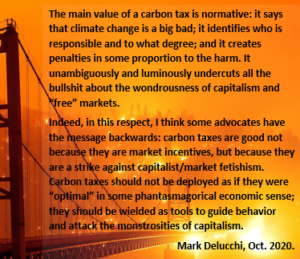
Background image: Birdwell Bar Bridge over Lake Oroville, CA, Sept 2020.
Of the dozens of replies to our two latest posts — last week’s tutorial about carbon pricing’s success in narrowing California’s “EJ gap” and this week’s appeal to climate hawks to stop disparaging carbon pricing and instead welcome it as a pillar of climate policy — the one that struck with the greatest force was this message shown at right from U-C Berkeley cost-benefit analyst Mark Delucchi.
Mark, you could say, is a heavy hitter. Starting around 1990 he gained renown for his monumental work cataloguing and quantifying the societal costs of U.S. motor vehicle use. This 1996 article in the University of California Transportation Center’s Access journal only hints at the range and erudition of that immense project, but is nevertheless a good introduction to Mark’s work.
He later teamed up with Stanford civil and environmental engineering professor Mark Z. Jacobson to generate an equally prodigious series of “roadmaps” outlining, at the state, national and global levels, the logistics and benefits of converting the world’s energy systems entirely to “100% wind, water and sunlight.” For a compelling and accessible entree to that body of work see this 2016 article in Science Direct.
Mark’s message about carbon taxing, which I’ve lifted from an email he sent, speaks for itself. I’m particularly drawn to his appeal to deploy carbon taxes not in specious pursuit of absolute economic efficiency, but to guide behavior.
Of late, among the left it has become fashionable — obligatory, even — to denigrate carbon pricing as a neoliberal “market measure” and to dismiss the quest to enact carbon taxes as, at best, a misguided distraction, or, at worst, a means of further subjugating oppressed peoples. Mark’s framing underscores that carbon taxes are more truly the opposite: a tool with which to attack predatory capitalism and aid in the struggle for a just and sustainable world.


Drew Keeling says
I agree that “the main value of a carbon tax is normative,” but for a somewhat different mix of reasons than the one advanced here.
From what I have observed of “the left [sic]…denigrating” carbon pricing as a “neoliberal market measure,”’ it typically goes beyond misguided “fashionable” dismissal, because such efforts are too often embedded in a kind of tokenist, incrementalist and fundamentally symbolic yet systematically corporatized pseudo progressivism that has much to do with attitude and stance, and little to do with actual achievement of tangible reform.
Although a persuasive case is made here that pro-carbon-tax is more anti-capitalist than anti-carbon-tax, capitalism per se is not really the main issue.
The main “normative value” is that global climate change (caused by large users of carbon fuels, whether capitalist, socialist, fascist, anarchist, hedonist or other) is a “big bad” because it is a monstrously huge -and mitigatable but not being mitigated (and thus both huge and monstrous)- quality of life expropriation from future generations on a global scale and over a time frame of centuries.
I quite agree that “framing” is crucial, but I see education as even more crucial, and the education required here is not PhD level. Back in the bygone 1970s when the “energy crisis” created record lines at gas stations, and I was a UC student taking freshman year economics, Pigovian taxes was one of the topics. We learned the difference between “positive” and “normative”, and that “market failures” were a positive question. If the economic system uses markets (and just about every place now does to some extent, even North Korea), then it is important to realize that there are market failures such as externalities and public goods.
It is a positive conclusion that Pigovian taxation can be one efficient means of correcting for mispricing (nonpricing) of external costs, such as carbon emissions leading to global climate disruption. It is a positive statement that education can provide both public good and externalized benefits. It is a positive argument that better education in economics and climate change is an effective way to help improve understanding of and support for carbon taxes. It is a positive realization that, because atmospheric CO2 is cumulative and there are growing risks of positive climate change feedback loops, time is not on our side, and the longer we wait to act substantively the more radical the measures needed for achieving any given level of CO2 stabilization.
It is a set of normative assertions that we therefore ought to place greater emphasis on education about carbon taxation, and that this website has both a remarkable and solid track record and ongoing further potential to contribute to that worthy effort.